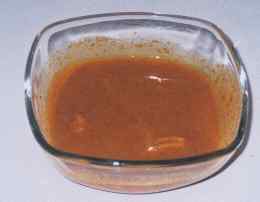Facts About Amba
Amba is a tangy mango pickle that originates from Iraq but has carved out a unique niche in Israeli cuisine. Made from pickled green mangoes, vinegar, salt, turmeric, chili, and fenugreek, it boasts a savory flavor similar to that of mango chutneys. The name "amba" likely derives from the Marathi word "āmbā" which itself traces back to the Sanskrit word "āmra" meaning mango.
Legend has it that amba was concocted in the 19th century by the Sassoon family from Bombay. These Iraqi Jews from Baghdad subsequently introduced it to Israel in the 1950s. In Israel, amba has become a beloved condiment, frequently used in sandwiches, paired with hummus, and served alongside other mezzes. The Israeli variant stands out for its use of unripe green mangoes, imparting a more savory flavor compared to the sweeter Indian version.
There are various versions of amba. The Iraqi version is often combined with fish dishes, falafel, kubbah, kebabs, and eggs. In Saudi Arabia and the Arabian Peninsula, people enjoy a rendition of amba with bread as part of their breakfast or dinner. On the other hand, the Indian version resembles South Asian pickle achar but is sweeter and thicker than the Israeli variety.
Amba is frequently mentioned in literary works, particularly memoirs. In "Baghdad Yesterday" by Sasson Somekh, an entire chapter is dedicated to amba, reflecting on the history of the Iraqi Jewish community. Khalid Qisthini, a columnist for Asharq al-Awsat, also nostalgically recalls Baghdad's past, highlighting amba and samoon as iconic foods of the region.

 Saudi Arabia
Saudi Arabia